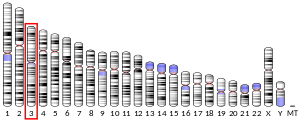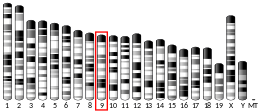CXCR6
C-X-C chemokine receptor type 6 is a protein that in humans is encoded by the CXCR6 gene.[5][6][7] CXCR6 has also recently been designated CD186 (cluster of differentiation 186).
CXCR6 has been identified as an entry coreceptor used by HIV-1 and SIV to enter target cells, in conjunction with CD4.[5][6][7][8] It is a minor coreceptor for HIV-1, nearly all strains of which use CCR5 and/or CXCR4. Most SIV strains can use CXCR6 and recent evidence suggests that in monkeys that serve as the natural hosts of SIV, CXCR6 may be a major coreceptor.[8] CXCR6 was previously known as "Bonzo" and "STRL33" in the HIV/SIV field.
References
- GRCh38: Ensembl release 89: ENSG00000172215 - Ensembl, May 2017
- GRCm38: Ensembl release 89: ENSMUSG00000048521 - Ensembl, May 2017
- "Human PubMed Reference:". National Center for Biotechnology Information, U.S. National Library of Medicine.
- "Mouse PubMed Reference:". National Center for Biotechnology Information, U.S. National Library of Medicine.
- Liao F, Alkhatib G, Peden KW, Sharma G, Berger EA, Farber JM (June 1997). "STRL33, A novel chemokine receptor-like protein, functions as a fusion cofactor for both macrophage-tropic and T cell line-tropic HIV-1". The Journal of Experimental Medicine. 185 (11): 2015–23. doi:10.1084/jem.185.11.2015. PMC 2196334. PMID 9166430.
- Deng HK, Unutmaz D, KewalRamani VN, Littman DR (July 1997). "Expression cloning of new receptors used by simian and human immunodeficiency viruses". Nature. 388 (6639): 296–300. doi:10.1038/40894. PMID 9230441.
- "Entrez Gene: CXCR6 chemokine (C-X-C motif) receptor 6".
- Elliott ST, Wetzel KS, Francella N, Bryan S, Romero DC, Riddick NE, Shaheen F, Vanderford T, Derdeyn CA, Silvestri G, Paiardini M, Collman RG (September 2015). "Dualtropic CXCR6/CCR5 Simian Immunodeficiency Virus (SIV) Infection of Sooty Mangabey Primary Lymphocytes: Distinct Coreceptor Use in Natural versus Pathogenic Hosts of SIV". Journal of Virology. 89 (18): 9252–61. doi:10.1128/JVI.01236-15. PMC 4542357. PMID 26109719.
Further reading
- Ruibal-Ares BH, Belmonte L, Baré PC, Parodi CM, Massud I, de Bracco MM (January 2004). "HIV-1 infection and chemokine receptor modulation". Current HIV Research. 2 (1): 39–50. doi:10.2174/1570162043484997. PMID 15053339.
- Loetscher M, Amara A, Oberlin E, Brass N, Legler D, Loetscher P, D'Apuzzo M, Meese E, Rousset D, Virelizier JL, Baggiolini M, Arenzana-Seisdedos F, Moser B (September 1997). "TYMSTR, a putative chemokine receptor selectively expressed in activated T cells, exhibits HIV-1 coreceptor function". Current Biology. 7 (9): 652–60. doi:10.1016/S0960-9822(06)00292-2. PMID 9285716.
- Hoffman TL, Stephens EB, Narayan O, Doms RW (September 1998). "HIV type I envelope determinants for use of the CCR2b, CCR3, STRL33, and APJ coreceptors". Proceedings of the National Academy of Sciences of the United States of America. 95 (19): 11360–5. doi:10.1073/pnas.95.19.11360. PMC 21647. PMID 9736741.
- Schramm B, Penn ML, Speck RF, Chan SY, De Clercq E, Schols D, Connor RI, Goldsmith MA (January 2000). "Viral entry through CXCR4 is a pathogenic factor and therapeutic target in human immunodeficiency virus type 1 disease". Journal of Virology. 74 (1): 184–92. doi:10.1128/JVI.74.1.184-192.2000. PMC 111527. PMID 10590105.
- Tscherning-Casper C, Vödrös D, Menu E, Aperia K, Fredriksson R, Dolcini G, Chaouat G, Barré-Sinoussi F, Albert J, Fenyö EM (May 2000). "Coreceptor usage of HIV-1 isolates representing different genetic subtypes obtained from pregnant Cameroonian women. European Network for In Utero Transmission of HIV-1". Journal of Acquired Immune Deficiency Syndromes. 24 (1): 1–9. doi:10.1097/00126334-200005010-00001. PMID 10877489.
- Ignatius R, Wei Y, Beaulieu S, Gettie A, Steinman RM, Pope M, Mojsov S (July 2000). "The immunodeficiency virus coreceptor, Bonzo/STRL33/TYMSTR, is expressed by macaque and human skin- and blood-derived dendritic cells". AIDS Research and Human Retroviruses. 16 (11): 1055–9. doi:10.1089/08892220050075318. PMID 10933620.
- Unutmaz D, Xiang W, Sunshine MJ, Campbell J, Butcher E, Littman DR (September 2000). "The primate lentiviral receptor Bonzo/STRL33 is coordinately regulated with CCR5 and its expression pattern is conserved between human and mouse". Journal of Immunology. 165 (6): 3284–92. doi:10.4049/jimmunol.165.6.3284. PMID 10975845.
- Matloubian M, David A, Engel S, Ryan JE, Cyster JG (October 2000). "A transmembrane CXC chemokine is a ligand for HIV-coreceptor Bonzo". Nature Immunology. 1 (4): 298–304. doi:10.1038/79738. PMID 11017100.
- Wilbanks A, Zondlo SC, Murphy K, Mak S, Soler D, Langdon P, Andrew DP, Wu L, Briskin M (April 2001). "Expression cloning of the STRL33/BONZO/TYMSTRligand reveals elements of CC, CXC, and CX3C chemokines". Journal of Immunology. 166 (8): 5145–54. doi:10.4049/jimmunol.166.8.5145. PMID 11290797.
- Lee B, Leslie G, Soilleux E, O'Doherty U, Baik S, Levroney E, Flummerfelt K, Swiggard W, Coleman N, Malim M, Doms RW (December 2001). "cis Expression of DC-SIGN allows for more efficient entry of human and simian immunodeficiency viruses via CD4 and a coreceptor". Journal of Virology. 75 (24): 12028–38. doi:10.1128/JVI.75.24.12028-12038.2001. PMC 116098. PMID 11711593.
- Calabresi PA, Yun SH, Allie R, Whartenby KA (June 2002). "Chemokine receptor expression on MBP-reactive T cells: CXCR6 is a marker of IFNgamma-producing effector cells". Journal of Neuroimmunology. 127 (1–2): 96–105. doi:10.1016/S0165-5728(02)00106-6. PMID 12044980.
- Kim CH, Johnston B, Butcher EC (July 2002). "Trafficking machinery of NKT cells: shared and differential chemokine receptor expression among V alpha 24(+)V beta 11(+) NKT cell subsets with distinct cytokine-producing capacity". Blood. 100 (1): 11–6. doi:10.1182/blood-2001-12-0196. PMID 12070001.
- Duggal P, An P, Beaty TH, Strathdee SA, Farzadegan H, Markham RB, Johnson L, O'Brien SJ, Vlahov D, Winkler CA (June 2003). "Genetic influence of CXCR6 chemokine receptor alleles on PCP-mediated AIDS progression among African Americans". Genes and Immunity. 4 (4): 245–50. doi:10.1038/sj.gene.6363950. PMID 12761559.
- Koprak S, Matheravidathu S, Springer M, Gould S, Dumont FJ (May 2003). "Down-regulation of cell surface CXCR6 expression during T cell activation is predominantly mediated by calcineurin". Cellular Immunology. 223 (1): 1–12. doi:10.1016/S0008-8749(03)00130-8. PMID 12914753.
- Shimaoka T, Nakayama T, Fukumoto N, Kume N, Takahashi S, Yamaguchi J, Minami M, Hayashida K, Kita T, Ohsumi J, Yoshie O, Yonehara S (February 2004). "Cell surface-anchored SR-PSOX/CXC chemokine ligand 16 mediates firm adhesion of CXC chemokine receptor 6-expressing cells". Journal of Leukocyte Biology. 75 (2): 267–74. doi:10.1189/jlb.1003465. PMID 14634054.
External links
- "Chemokine Receptors: CXCR6". IUPHAR Database of Receptors and Ion Channels. International Union of Basic and Clinical Pharmacology.
- Human CXCR6 genome location and CXCR6 gene details page in the UCSC Genome Browser.
This article incorporates text from the United States National Library of Medicine, which is in the public domain.
This article is issued from Wikipedia. The text is licensed under Creative Commons - Attribution - Sharealike. Additional terms may apply for the media files.





